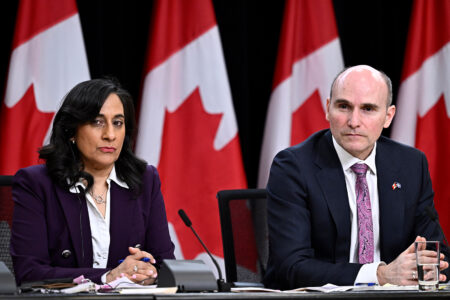
Netflix’s documentary The Social Dilemma has many Canadians rethinking their intimate relationship with big tech. Among the many revelations, Canadians learned how these multinational firms deeply ingrain artificial intelligence (AI) technologies like machine learning algorithms (MLAs) in their decision-making to advance their corporate agendas. By harvesting and learning from vast amounts of data, MLAs enable these firms to manipulate consumers’ actions based on predicted behavioural patterns, helping them reach record high profits while gaining a quasi-monopoly market power, even in the context of a global pandemic.
But MLAs don’t have to be only fixated on serving the corporate needs and monetary profits of big tech firms owned by American billionaires such as Facebook’s Mark Zuckerberg and Google’s co-founder Sergey Brin.
Instead, imagine a not-so-distant future where Canadian policy-makers are responsibly embedding MLAs to better monitor, anticipate and respond to the unique needs of Canada’s diverse regions – from large urban centres to remote rural areas.
This is the Max Bell School’s Policy Lab challenge that Canada Economic Development for Quebec Regions is asking graduate students to work on and report back by July 2021.
Transforming regional economic development
Canada is a vast country. Its regions face different realities, as highlighted by how the pandemic impacts’ were felt differently depending on where Canadians lived. Regional policies in OECD countries can also suffer from a strong urban bias, leaving rural areas behind. So, regional development policy-makers are constantly challenged to become better connected and respond to their citizens’ unique realities.
Given the increasing availability and complexity of regional and real-time data from various government and private sources, the time is ripe for policy-makers engaged in regional development to explore MLAs that have shown success in different application fields, from particle physics to medicine. Indeed, when MLAs were introduced in the medical field, doctors could make sense of a vast amount of patient data that would have been otherwise impossible to track manually. This helped them segment cancer patients based on their physical and genetic characteristics, resulting in more customized and effective treatments with reduced side effects.
Governments globally are also looking towards more inclusive and sustainable 21st century development models to better support all rural and urban communities in fully realizing their potential. From the OECD’s Regional Well-Being to Kate Raworth’s Doughnut Economics, these more complex models go beyond GDP and can help assess a region’s well-being with up to 18 socioeconomic and environmental indicators.
With the multiplication of regional data, models and indicators available, MLAs can help regional policy-makers gather, organize and segment this complex web of information to obtain unprecedented situational awareness of the unique regional needs of communities, businesses and entrepreneurs across Canada. This can potentially narrow the “information gap” between decision-makers and Canada’s diverse regions, reducing biases, and resulting in more inclusive and sustainable post-pandemic recovery policies.
In the context of global economic disruptions caused by a viral pandemic, climate change and rapid technological advances, policy-makers have additional pressures to have accurate and timely data that inform responses to workers’ and businesses’ regional needs. MLAs can help them track potential early warning signals in real-time.
For instance, in the U.S., the level of the decline in electricity use helped experts accurately anticipate a region’s corresponding decline in economic activity during the COVID-19 pandemic – well before the release of any official statistics. As more Canadians resort to online learning platforms like LinkedIn Learning, MLAs can also assist policy-makers in anticipating the sought after business skills to prepare for the future of work in Canada’s diverse regions – one that is increasingly skills-oriented rather than degree-based.
To be clear, MLAs would not replace policy-makers’ ability to make decisions. Instead, they serve as additional tools in making post-pandemic regional programs in Canada more evidence-based and better adapted to emerging inclusive and sustainable economic development models. Canadian governments can then timely respond with “place-based” initiatives – ones uniquely customized to a region’s geographic assets and socioeconomic characteristics.
The dangers of inaction
Despite being widely praised as transformational and attracting huge government investments worldwide, including in Canada, AI public sector usage trails behind the private sector. A review of 18 AI strategies globally confirms that Canada, 14 other countries and the European Union are not placing great emphasis on AI in government applications relative to other areas.
The non-profit Centre for Public Impact closely examined this public-private AI disparity back in 2017. It warned that governments’ slow AI adoption in policy-making risks eventually generating a crisis to their legitimacy. In other words, private firms like Google, Apple and Amazon could overshadow governments globally by emerging as the de facto solutions provider to complex environmental and societal challenges, including climate change and COVID-19.
To date, citizens and governments have rightly considered AI’s downfalls, including its potential in exacerbating privacy risks, social inequities and gender biases. There is a danger that policy-makers may either be too fixated on AI risks or lack awareness of its potential capabilities in making public policies more inclusive. Indeed, most American government executives lack a clear vision of potential AI applications. With AI’s steep learning curve, technical challenges and its relative novelty to the policy-making community, this is to be expected.
Canada is well-positioned
Without increased AI capability awareness, improved digital literacy and deliberate experimental actions and partnerships in AI by Canadian policy-makers in all fields, adoption will be slow. In a potentially prolonged economic crisis, Canadian decision-makers could miss out on harnessing AI’s positive potential to improve their communities’ lives post-pandemic.
There is already much cause for optimism, however. According to the world’s first Government AI Readiness Index, Canada is well-positioned to take advantage of AI benefits for public services, ranking sixth out of 194 countries. Canada is also a global leader in promoting responsible AI, generating the Montreal Declaration for the Responsible Development of AI and launching the Directive on Automated Decision-Making and the Algorithmic Impact Assessment. These will guide federal policy-makers in the transparent and accountable use of AI algorithms.
By bringing Canada’s responsible AI global leadership to the forefront today, decision-makers can build on the incredible potential of machine learning algorithms to positively transform this country’s regional recovery policies to achieve a more inclusive and sustainable future for all Canadians, no matter where they live.
Photo: Shutterstock/By MNBB Studio









